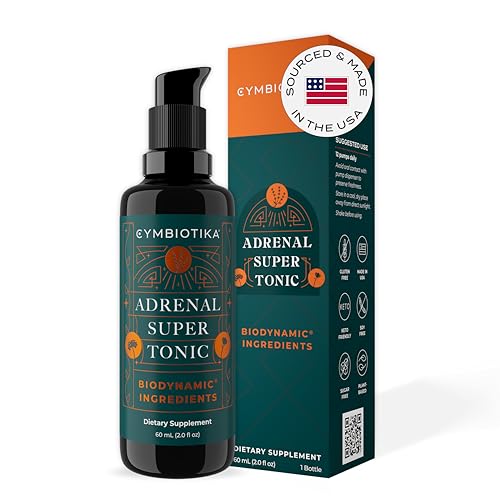
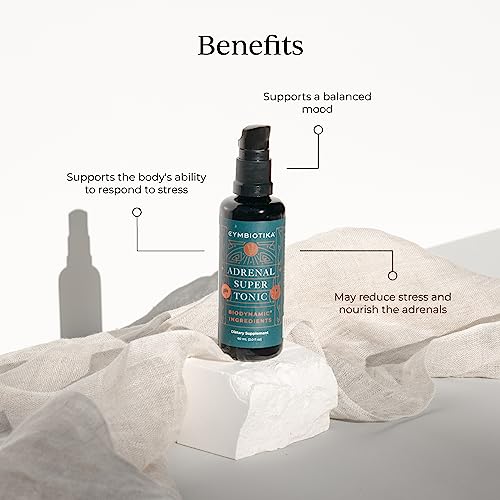
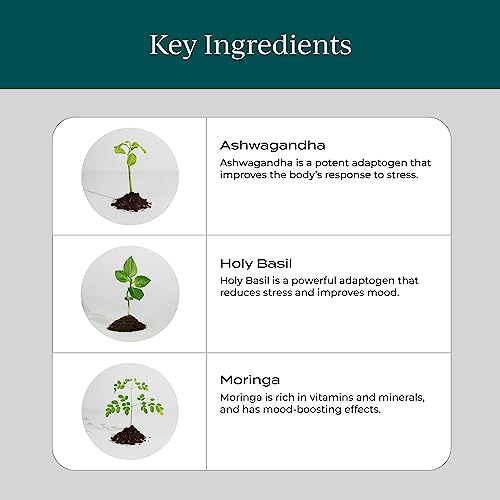
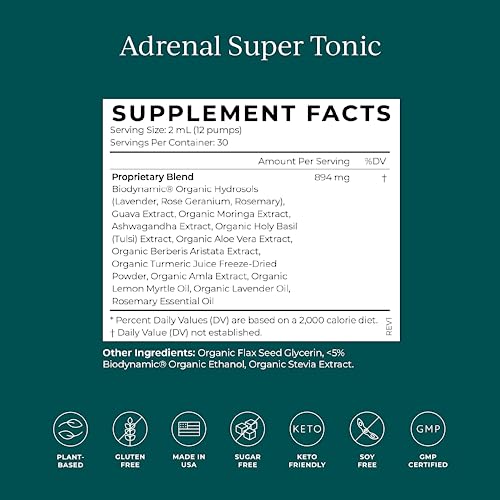
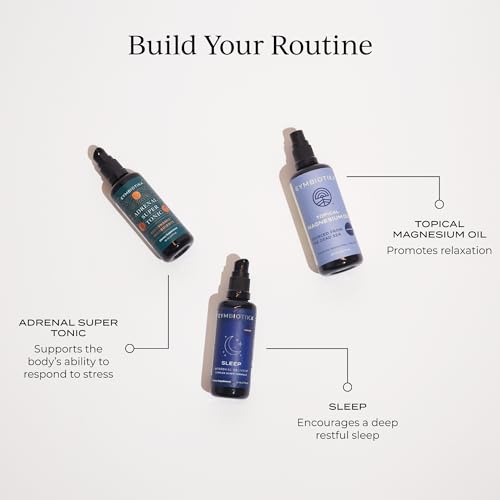

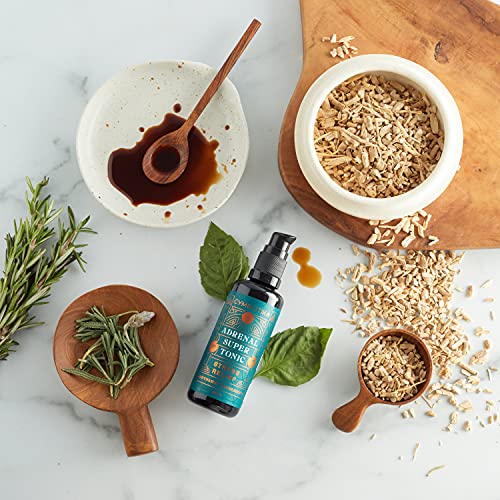
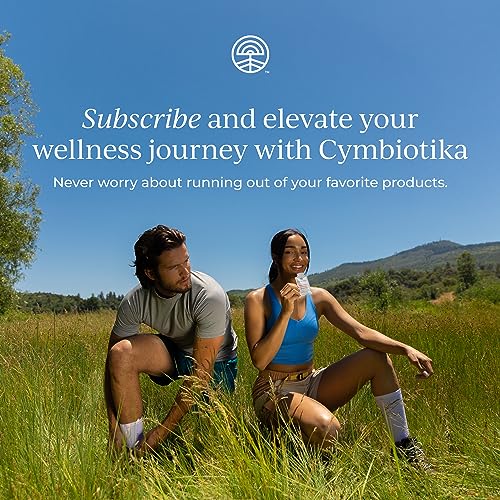
CYMBIOTIKA Adrenal Super Tonic - Immune Support & Relaxation with Ashwagandha, Vegan, 2 fl oz


Pelargonium Graveolens (Geranium)
High RiskPelargonium graveolens, commonly known as geranium, is a plant used in cosmetics for its fragrance and potential skin-soothing properties. It is often included in formulations for its aromatic qualities and as a natural ingredient in various personal care products.
Sustai Insights
Geranium oil offers functional benefits such as fragrance enhancement and potential skin calming effects. However, it has a high allergenic potential, posing risks, especially for sensitive individuals. While it is not classified as a carcinogen or reproductive toxin, regulatory bodies do not impose significant restrictions. Its overall risk level is assessed as high due to these allergy concerns. Users should practice caution, particularly those with sensitivities, and consider alternatives like lavender or rose essential oils for fragrance without the associated allergy risks.
Unspecified Botanical Oil(s)
Medium RiskUnspecified botanical oils are natural extracts derived from various plant sources, commonly used in cosmetic and personal care products for their moisturizing, emollient, and fragrance properties. These oils can serve multiple functions, including enhancing product texture and providing skin benefits.
Sustai Insights
Unspecified botanical oils offer functional benefits such as moisturizing and emollient properties, contributing positively to product texture. Sustainability can be affirmed if sourced ethically. Health risks are low for carcinogenicity, allergies, and reproductive toxicity. Environmental concerns are minimal; however, regulatory bodies advise cautious use. Overall, the ingredient has a medium risk level, and users should consider alternatives like specific plant oils with established safety profiles.
Linum Usitatissimum (Flax) Seed
Low RiskLinum usitatissimum, commonly known as flaxseed, is derived from the seeds of the flax plant. It is primarily used in cosmetics and personal care products for its moisturizing properties and as a source of omega-3 fatty acids, which can contribute to skin health.
Sustai Insights
Flaxseed offers functional benefits such as hydration and nourishment for the skin, with sustainability credentials due to its biodegradability and renewable sourcing. Health risks are minimal, with low concerns regarding carcinogenicity, allergies, and reproductive toxicity. Environmental impact is also low, with no significant pollutant potential. Regulatory bodies do not impose restrictions on its use. Overall, the ingredient is assessed to have a low-risk profile, making it a safe component in personal care formulations. Alternatives may include other plant-based oils that offer similar moisturizing effects.
Lavandula (Lavender) Flower
Low RiskLavandula (lavender) flower refers to unspecified preparations of the lavender plant, known for its aromatic properties. It is commonly used in various products for fragrance and potential therapeutic benefits, such as calming effects. The ingredient has a low risk profile regarding common health concerns.
Sustai Insights
Lavender flower offers functional benefits primarily as a fragrance and potential calming agent in products. It is considered sustainably sourced with low environmental impact and is not associated with significant health risks, such as carcinogenicity, allergies, or reproductive toxicity. Regulatory bodies, including the FDA, do not impose restrictions on its use. However, as with any ingredient, proper usage is recommended to mitigate any minor irritation risks. Overall, it presents a low-risk profile, making it a favorable choice in formulations.
Sd Alcohol 38 B
Low RiskSpecially denatured (SD) alcohol 38 B is a mixture of ethanol and specific denaturants designed to prevent ingestion while retaining its properties for use in cosmetics and personal care products. It serves as a solvent and can also enhance the absorption of other ingredients.
Sustai Insights
SD alcohol 38 B functions effectively as a solvent and can improve product stability and absorption. It is typically considered low risk for carcinogenicity, allergens, and non-reproductive organ system toxicity. However, potential irritation and moderate risks to developmental and reproductive health have been noted. Environmental concerns include its pollutant potential, although it is not bioaccumulative. Regulatory bodies do not impose significant restrictions on its use. Overall, the ingredient is assessed as low risk, and users should observe safe usage practices. Alternatives include plant-based alcohols or other non-toxic solvents.
Rosemary
Low RiskRosemary is a material derived from the Rosmarinus officinalis plant, commonly used in various products for its aromatic properties and potential antioxidant benefits. It serves primarily as a natural preservative and fragrance component.
Sustai Insights
Rosemary offers functional benefits as a natural preservative and antioxidant, with sustainability credentials due to its biodegradability and renewable sourcing. Health risks are low, with negligible concerns regarding carcinogenicity, allergenic potential, or reproductive toxicity. Environmental risks are minimal, with no significant pollutant or bioaccumulation issues. Regulatory bodies, including the FDA, do not impose restrictions on its use. Overall, rosemary is assessed as low risk, making it a suitable ingredient in formulations.
Psidium Guajava (Guava) Fruit Extract
Low RiskPsidium guajava (guava) fruit extract is an extract derived from the fruit of the guava tree. It is commonly used in cosmetic and personal care products for its potential antioxidant properties and as a natural fragrance component.
Sustai Insights
Psidium guajava fruit extract offers functional benefits such as antioxidant properties and skin conditioning. It is not associated with significant health risks, including low concerns for carcinogenicity, allergies, or reproductive toxicity. Environmentally, it poses minimal risk, with no known pollutant or bioaccumulation issues. Regulatory assessments indicate no restrictions, contributing to an overall low-risk classification. Safe usage practices are encouraged, and while there are no widely recognized alternatives, the extract's sustainability credentials may enhance its appeal in formulations.
Vegetarian Glycerin
Low RiskVegetarian glycerin, also known as glycerol, is a colorless, odorless, and viscous liquid derived from plant sources. It is primarily used as a humectant, solvent, and emollient in various personal care products, helping to retain moisture and improve texture.
Sustai Insights
Vegetarian glycerin offers functional benefits as an effective humectant, promoting hydration and skin smoothness. It is biodegradable and typically sustainably sourced. Health risks associated with glycerin are low, with no significant concerns for carcinogenicity, allergens, or reproductive toxicity. Environmental risks are minimal, and it is not subject to major regulatory warnings. Overall, the risk level for this ingredient is low, making it a safe choice in formulations. Safe usage practices include ensuring proper concentrations in products, and alternatives such as propylene glycol exist but may have differing properties.
Linum Usitatissimum (Flax) Seed
Low RiskLinum usitatissimum, commonly known as flaxseed, is derived from the seeds of the flax plant. It is primarily used in cosmetics and personal care products for its moisturizing properties and as a source of omega-3 fatty acids, which can contribute to skin health.
Sustai Insights
Flaxseed offers functional benefits such as hydration and nourishment for the skin, with sustainability credentials due to its biodegradability and renewable sourcing. Health risks are minimal, with low concerns regarding carcinogenicity, allergies, and reproductive toxicity. Environmental impact is also low, with no significant pollutant potential. Regulatory bodies do not impose restrictions on its use. Overall, the ingredient is assessed to have a low-risk profile, making it a safe component in personal care formulations. Alternatives may include other plant-based oils that offer similar moisturizing effects.
Pelargonium Graveolens (Geranium)
High RiskPelargonium graveolens, commonly known as geranium, is a plant used in cosmetics for its fragrance and potential skin-soothing properties. It is often included in formulations for its aromatic qualities and as a natural ingredient in various personal care products.
Sustai Insights
Geranium oil offers functional benefits such as fragrance enhancement and potential skin calming effects. However, it has a high allergenic potential, posing risks, especially for sensitive individuals. While it is not classified as a carcinogen or reproductive toxin, regulatory bodies do not impose significant restrictions. Its overall risk level is assessed as high due to these allergy concerns. Users should practice caution, particularly those with sensitivities, and consider alternatives like lavender or rose essential oils for fragrance without the associated allergy risks.
Unspecified Botanical Oil(s)
Medium RiskUnspecified botanical oils are natural extracts derived from various plant sources, commonly used in cosmetic and personal care products for their moisturizing, emollient, and fragrance properties. These oils can serve multiple functions, including enhancing product texture and providing skin benefits.
Sustai Insights
Unspecified botanical oils offer functional benefits such as moisturizing and emollient properties, contributing positively to product texture. Sustainability can be affirmed if sourced ethically. Health risks are low for carcinogenicity, allergies, and reproductive toxicity. Environmental concerns are minimal; however, regulatory bodies advise cautious use. Overall, the ingredient has a medium risk level, and users should consider alternatives like specific plant oils with established safety profiles.
Lavandula (Lavender) Flower
Low RiskLavandula (lavender) flower refers to unspecified preparations of the lavender plant, known for its aromatic properties. It is commonly used in various products for fragrance and potential therapeutic benefits, such as calming effects. The ingredient has a low risk profile regarding common health concerns.
Sustai Insights
Lavender flower offers functional benefits primarily as a fragrance and potential calming agent in products. It is considered sustainably sourced with low environmental impact and is not associated with significant health risks, such as carcinogenicity, allergies, or reproductive toxicity. Regulatory bodies, including the FDA, do not impose restrictions on its use. However, as with any ingredient, proper usage is recommended to mitigate any minor irritation risks. Overall, it presents a low-risk profile, making it a favorable choice in formulations.
Sd Alcohol 38 B
Low RiskSpecially denatured (SD) alcohol 38 B is a mixture of ethanol and specific denaturants designed to prevent ingestion while retaining its properties for use in cosmetics and personal care products. It serves as a solvent and can also enhance the absorption of other ingredients.
Sustai Insights
SD alcohol 38 B functions effectively as a solvent and can improve product stability and absorption. It is typically considered low risk for carcinogenicity, allergens, and non-reproductive organ system toxicity. However, potential irritation and moderate risks to developmental and reproductive health have been noted. Environmental concerns include its pollutant potential, although it is not bioaccumulative. Regulatory bodies do not impose significant restrictions on its use. Overall, the ingredient is assessed as low risk, and users should observe safe usage practices. Alternatives include plant-based alcohols or other non-toxic solvents.
Rosemary
Low RiskRosemary is a material derived from the Rosmarinus officinalis plant, commonly used in various products for its aromatic properties and potential antioxidant benefits. It serves primarily as a natural preservative and fragrance component.
Sustai Insights
Rosemary offers functional benefits as a natural preservative and antioxidant, with sustainability credentials due to its biodegradability and renewable sourcing. Health risks are low, with negligible concerns regarding carcinogenicity, allergenic potential, or reproductive toxicity. Environmental risks are minimal, with no significant pollutant or bioaccumulation issues. Regulatory bodies, including the FDA, do not impose restrictions on its use. Overall, rosemary is assessed as low risk, making it a suitable ingredient in formulations.
Psidium Guajava (Guava) Fruit Extract
Low RiskPsidium guajava (guava) fruit extract is an extract derived from the fruit of the guava tree. It is commonly used in cosmetic and personal care products for its potential antioxidant properties and as a natural fragrance component.
Sustai Insights
Psidium guajava fruit extract offers functional benefits such as antioxidant properties and skin conditioning. It is not associated with significant health risks, including low concerns for carcinogenicity, allergies, or reproductive toxicity. Environmentally, it poses minimal risk, with no known pollutant or bioaccumulation issues. Regulatory assessments indicate no restrictions, contributing to an overall low-risk classification. Safe usage practices are encouraged, and while there are no widely recognized alternatives, the extract's sustainability credentials may enhance its appeal in formulations.
Vegetarian Glycerin
Low RiskVegetarian glycerin, also known as glycerol, is a colorless, odorless, and viscous liquid derived from plant sources. It is primarily used as a humectant, solvent, and emollient in various personal care products, helping to retain moisture and improve texture.
Sustai Insights
Vegetarian glycerin offers functional benefits as an effective humectant, promoting hydration and skin smoothness. It is biodegradable and typically sustainably sourced. Health risks associated with glycerin are low, with no significant concerns for carcinogenicity, allergens, or reproductive toxicity. Environmental risks are minimal, and it is not subject to major regulatory warnings. Overall, the risk level for this ingredient is low, making it a safe choice in formulations. Safe usage practices include ensuring proper concentrations in products, and alternatives such as propylene glycol exist but may have differing properties.
Discover the CYMBIOTIKA Adrenal Super Tonic Liquid Supplement, expertly crafted to enhance overall health and vitality. This delicious berry-flavored tonic combines the power of ashwagandha, zinc, and holy basil to support immune function and relaxation in a convenient liquid form.
- Immune Support: Formulated with biodynamic ingredients, this supplement promotes immune health and combats fatigue, making it ideal for daily wellness.
- Relaxation & Stress Relief: Featuring ashwagandha and holy basil, it helps the body adapt to stress while fostering a sense of calm and balance.
- Versatile Use: Easily integrated into your routine, simply take 12 pumps daily or mix it into your favorite beverage for a refreshing boost.
- Health-Conscious Formula: This vegan, gluten-free, and keto-friendly supplement contains no chemicals, animal products, or preservatives, ensuring a natural choice for health-oriented consumers.
- Trusted Quality: With a commitment to transparency and ethical practices, Cymbiotika combines traditional medicine with innovative absorption technology for optimal results.
Subscribe & Save with Sustai
- Best Price Guarantee: Always enjoy the lowest prices on sustainable home essentials.
- No Surprises: We’ll notify you before shipping. No hidden fees, ever.
- You’re in Charge: Change, pause, or cancel your subscription anytime with ease.
- Eco-Friendly Deliveries: Our grouped shipments mean less packaging and lower emissions.
Join us on a sustainable journey. Special offers for a limited time! Prices and promotions may change.
Recommended Products
Discover the CYMBIOTIKA Adrenal Super Tonic Liquid Supplement, expertly crafted to enhance overall health and vitality. This delicious berry-flavored tonic combines the power of ashwagandha, zinc, and holy basil to support immune function and relaxation in a convenient liquid form.
- Immune Support: Formulated with biodynamic ingredients, this supplement promotes immune health and combats fatigue, making it ideal for daily wellness.
- Relaxation & Stress Relief: Featuring ashwagandha and holy basil, it helps the body adapt to stress while fostering a sense of calm and balance.
- Versatile Use: Easily integrated into your routine, simply take 12 pumps daily or mix it into your favorite beverage for a refreshing boost.
- Health-Conscious Formula: This vegan, gluten-free, and keto-friendly supplement contains no chemicals, animal products, or preservatives, ensuring a natural choice for health-oriented consumers.
- Trusted Quality: With a commitment to transparency and ethical practices, Cymbiotika combines traditional medicine with innovative absorption technology for optimal results.

You can have at most 2 Sustainable Steals products in your cart
Customer Reviews
Customers’ View
Customers appreciate the effectiveness and natural formulation of this Ashwagandha liquid supplement. Many users report enhanced relaxation, with several highlighting its ability to calm nerves and support muscle recovery. One customer noted, "this stuff really relaxes me," emphasizing its role in promoting overall wellness. The product's clean, vegan ingredients resonate well with health-conscious consumers, reinforcing its appeal as a safe choice for daily use. However, some customers express dissatisfaction with the taste, describing it as unpleasant and thick. Despite this, the product's benefits in relaxation and immune support are consistently praised. Overall, customers find value in its effectiveness while aligning with their eco-friendly and health-oriented lifestyles.
AI-generated from the text of customer reviewsThis product has no reviews yet.




